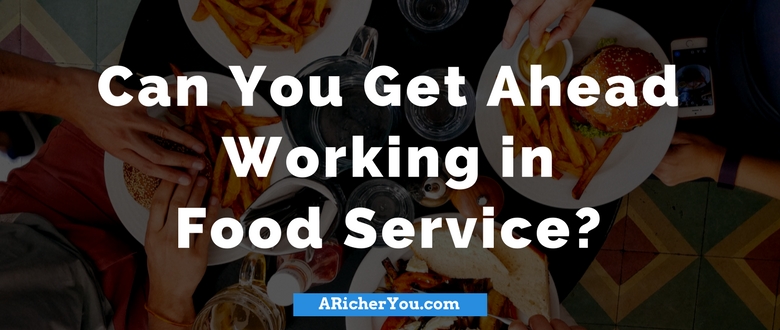Recently I wrote a post detailing my “career” working in restaurants. It was great to reflect on some of the choices I made coming out of college, especially with a less-than-marketable degree and entering a still rough economy.
A couple of things stuck with me after writing that post.
One, I haven't come across many personal finance blogs written by people who work in restaurants. Now, making money is making money, and there are a million ways to do it. It's crucial to stress how important what you choose to do with that money is, but first you have to make it. And (my second point) there's a gap between what you actually can make in this career and what most people probably think you can make.
So I ask: Can you get ahead with a career in the restaurant industry?
The Restaurant Industry Is Pretty Huge (and growing!)
Did you know that around 1 in 10 people work in the restaurant industry? It's a huge part of the economy and has been consistently growing over the last few years. I work in the “fast casual” sector, which has seen the fastest growth.

We've also been in a wonderful bull market and recovering-depending-on-who-you-ask economy for the last several years. Eating out for a lot of people is discretionary spending – meaning that if they lost their jobs it's probably one of the first areas they would cut. So it's not an industry immune to economic woes. That said, there are plenty of companies that have strong business models that would do fine if the economy were to take a dive again.
But here's the thing. For the most part, experience in one restaurant transfers to nearly any other restaurant really well. If you've waited tables anywhere, you could likely wait tables anywhere else. Which kicks off our pros and cons list…
Pros and Cons
Pros
- Extremely low barrier to entry. You don't need a college degree. Usually you don't even need prior restaurant experience if you're starting out on the bottom.
- Experience transfers, and training is provided. For the most part, the restaurants that continue to do well really emphasize training. And those skills transfer to virtually any restaurant within reason.
- These two things make it an extremely easy place to start a career.
- Speaking of career, it's also fairly easy to advance. I had no management experience whatsoever, through work or college, yet was still able to climb the ladder from shift lead to assistant manager and potentially store manager. Remember, training is provided, and a large proportion of management comes from moving up internally.
- In my view, someone who starts out making minimum wage and moves up to management is going to have a much easier time than a new college graduate with a management degree. A degree might help, but experience is much more important, especially if you climb the ladder in one restaurant. By the time you get to management, you have a lot less to learn.
So far we have an extremely low barrier to entry (no degrees or experience needed) and a great environment for trying to climb the career ladder (provided training and high turnover). While there's obviously less turnover the higher you get up the management chain, it still happens quite a bit.
It doesn't take much to earn seniority. You're getting paid for experience – experience that will transfer to a wide variety of restaurants and can even be marketed in other fields (although “escaping” into the coveted office job is seen as a difficult task).
There's also a few other aspects (and Cons) I'd like to mention:
Free/discounted meals
Depending on where you work, this can be great. The healthier the restaurant, the better. But if you work shifts a month, that's 20 meals either free or reduced.
Physically active/demanding
While being on your feet 8-10 hours a day isn't the best for your health, I would argue it's much better than sitting. And there's a good chance you're doing some walking in between bouts of standing. In some cases A LOT of walking. I easily hit 4 miles a day and know plenty of servers who double that. There's also a lot of other movement you won't necessarily get sitting in front of a computer all day.

That said, I'm physically beat after a day at work. If you're the type of person who likes that feeling and equates it with productivity then it's a good feeling to have.
As far as stress, it's probably about as stressful as most jobs. Definitely fast paced, and keeping your composure IN FRONT of people.
In my case, I've been in the same role long enough that mentally, it's not that taxing. Physically, it levels out. It kicks your ass at first, and then you get used to it.
Flexible, and sometimes erratic, schedules
Yes, I know there are plenty of horror stories out there about being called in at the last minute and getting schedules a day in advance. Depending on who you ask, the hours can be unpleasant also. And they can change. And you're lucky if you get Christmas and Thanksgiving off.
Again, this varies from place to place. And there's bad managers at every job, whether it's in a restaurant or not. As the scheduling manager, I prefer to give everyone the same schedule every week. It makes my job easier and it makes their lives easier.
Speaking of the hours, it's a good idea to consider what the “peaks” are of the place you're applying to are and if you're willing to work them. A place like Starbucks needs openers and morning staff, which means starting as early as 4am. If it's a chain like Outback then you'll be working mostly nights.
That said, peak restaurant hours are Off-Peak hours for everyone else. You're commuting in the morning before everyone, in between rush hours in the afternoon, and after rush hour in the evening. Your off days are also typically off peak, which makes errands like grocery shopping possible on a weekday morning and 100 times more pleasant.
For reference, I generally work 5am-2/3pm, lately M-F but at times weekends. Over my career I've worked every schedule, and the reality was that the one that made me feel the worst about my day was the mid shift. I couldn't do much before or after work and I was stuck in traffic both ways.
Pay
Okay, the big one.
Remember when McDonalds released that sample budget, where it was implied that at $7.25 an hour you could “make it work” with a second job, $20/month health insurance, and, ironically, no mention of food?
The reality is that a lot of restaurants, especially fast food ones, pay minimum wage. And fast food places are notorious for limited hours and lame benefits. And if you live in an economically depressed area, you might only have the option of working fast food.
But there are also a lot of places around the country where you have a ton of options, particular in “Fast Casual”.
Fast Casual includes places like Panera, Chipolte, Qdoba, Five Guys. Basically, fast food with better quality ingredients.
And better pay.
Here's the starting pay* for a few of the most popular chains in the fast casual segment:

*Numbers are estimates sourced from indeed.com.
Obviously these numbers can vary. It's also very possible that if you find yourself in a competitive market (like Nashville, TN) that's competing for restaurant workers, you can start out at a lot more than this.
There's also disparities between what hourly employees make and what managers make between different companies.
Remember though, experience at one place easily transfers to another AND paid training is provided. I can't tell you how much we love people who come to us from McDonalds because they already have the skills and experience we want and just want a better work environment.
You should also consider opportunities like overtime and potential bonuses.
At the manager level, it could get tricky. The FLSA Overtime Rule, which would convert anyone making under $47,476 on salary to hourly, where they would be eligible to earn overtime pay for anything over 40 hours a week, is currently on hold. There are some places that introduced changes to how managers were paid in late 2016 in preparation for the law going into effect.
The takeaway from all this is that once you reach management, it's important to take a hard look at your pay structure and hourly commitments. It's still common for salaried managers to work 60-70 hours a week while only getting paid for 40 in many places.
When it comes to pay, I focused on the fast casual segment for a couple of reasons:
- It's growing rapidly and is easily accessible to those working in typical fast food places.
- Starting pay, work environment, food, and benefits are usually better
- Management pay varies but is typically better and in many cases provides a better work life balance.
- One manager I knew came from the Cheesecake Factory, where she was making over $70k a year. She was also working at least 60 hours a week. Food for thought!
Takeaways
It looks like I haven't completely answered my original question:
Can you get ahead working in Food Service?
The short answer is Yes, I think you can. Remember, any job is going to have it's pros and cons. I think getting into food service is extremely easy, and moving up, particularly without more expensive education, is very accessible.
No, you're probably not going to be making 6 figures. But you can make enough to get ahead, assuming you control your costs.
There's terrible jobs out there, with terrible hours and demands and stress and managers and there are great jobs that are the complete opposite. The same goes for food service.
Oh, and one final takeaway, and this is where it gets into really getting ahead.
It's not uncommon for people to look down on you if you work in customer service. There's plenty of nice people out there and just as many who think your job is so easy a monkey could do it, that you're stupid or lazy and this was the only job you could get, or maybe that you weren't good enough to go to college and get a degree and a “real job”.
Anything in customer service is frustrating. People like instant gratification, and they're paying money for a product and service and thus feel powerful and in control.
At the same time, it's incredibly motivating to serve consumers every single day.
It's motivating to see people who tie so much of their self worth into what they do compared to other people.
It's motivating to see people who look exhausted and miserable because they're standing in line (or, more commonly, sitting in the drive thru) buying breakfast before work, a habit that delays their retirement by months or years.
It's motivating to see the way people treat each other, both good and bad, and how it makes you think about how you treat people.
You'll probably see that stuff in any job, but for me it's right in my face every single day. It's good fuel for a fire.
This article was written by Matt and originally published here. Matt has been blogging over at financeyoself.com for a little over a year now. He's twenty-nine years old and lives in Tennessee with his fiance and dog/illegitimate dependent. He also just bought a house!



